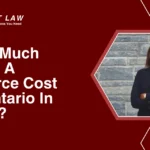Children have many participants in their lives, from parents to uncles, aunts, and even grandparents. These people play an important role in their guidance and support.
In Ontario, non-parents can appeal for an order for contact with the child. Then, the courts evaluate whether this can be accepted.
So, if you are a grandparent trying to understand grandparents rights in Ontario 2024, you are in the right place. Here is what you need to know about applying for visitation or child access in the event of the parent’s separation or divorce.
Grandparents Rights in Ontario under the Children’s Law Reform Act

In the past, grandparents in Ontario did not have clear rights to contact their grandchildren following their parents’ separation or divorce. However, Bill 34 S.21 (1) of the Children’s Law Reform Act has changed that, as grandparents can now make an argument for access during custody battles after separation.
Please note that the CLRA applies when parents aren’t married or have only separated. On the other hand, the Divorce Act will apply when couples are getting divorced or are already divorced.
Let’s review this Act in depth to understand grandparents rights in Ontario:
Bill 34 S.21 (1) of the Children’s Law Reform Act
The bill doesn’t automatically award you with the right to access your grandchild. Instead, it will be up to the Court to determine whether granting you child access or custody will be in the children’s best interest.
We recommend hiring a family lawyer in Ontario for this purpose that can present your case before the Court to determine that it will be in the best interests of your grandchildren to visit you.
11 Factors the Court Takes into Account When Evaluating Grandparent Rights to Access under the CLRA
According to the Children’s Law Reform Act, the Court will take the following factors into account when determining what is in the best interests of the child:
1. The child’s needs depend on the development stage and age. An example of this could be the need for routine and stability.
2. The strength and nature of the child’s relationship with the parents, each sibling, grandparent, and anyone else that has played a pivotal role in the child’s life.
3. The willingness of each parent to develop and maintain the child’s relationship with the other.
4. A history of the child’s care.
5. Preferences and views of the child, based on their maturity and age, unless they can’t be fathomed.
6. Future plans for the care of the child.
7. The willingness and ability of each person to whom the order would apply to meet the needs and care for the child.
8. The willingness and ability of each person to whom the order will apply to cooperate and communicate with one another on any matter that affects the child.
9. Family violence and its impact on:
- The willingness and ability of the person who engaged in this violence to meet the needs and care for the child.
- How appropriate it would be to make an order that will require the person on whom the order will apply to cooperate on the matters affecting the child.
10. Any criminal or civil proceedings, condition, order, or measure relevant to the child’s well-being.
11. The child’s religious, cultural, spiritual, and linguistic heritage and upbringing.
Grandparents Rights in Ontario under the Divorce Act

Now that we have some clarity regarding the CLRA, it is time to understand the grandparents rights in Ontario under the Divorce Act. Suppose the parents have gotten a divorce or are in the middle of a divorce. In that case, grandparents rights in Ontario will be determined by granting decision-making responsibility or parenting time to a contact or parenting order.
The Divorce Act was amended in 2020, and it now requires both spouses, parents, and anyone seeking a parental role in the child’s life to apply for a parenting order.
However, according to Section 16.1 (3) of the Divorce Act, non-spouses will have to seek the Court’s leave to obtain the parenting order.
Moreover, Section 16.5 (1) of the Divorce Act allows the courts to make an order providing for the contact between the child and the person. But, even with this, the Court will take various factors into account before it determines whether the contact can occur during the parenting time of one of the spouses.
These considerations are the same as the CLRA. The Divorce Act will take these into account before determining whether the order will be in the best interest of the child.
So, under the Divorce Act, non-parents such as grandparents can apply for access or custody. However, they must first obtain the leave of the Court to pursue the application for this purpose.
Under the Divorce Act, the grandparent will have to establish that they already have a close relationship with the child. To understand what will possibly happen in your specific circumstances, we recommend getting in touch with our family lawyer.
How to Apply for Grandparents Rights in Ontario
As a grandparent, the only way for you to apply for grandparents rights in Ontario is to make an application to the Court for a parenting order or a contact order respecting the decision-making responsibility with regard to the child.
However, if grandparents want to obtain this order, then they will have to satisfy the courts that they can provide suitable care and a home for the child. On the other hand, the Court will also determine the parent’s wishes before granting the order.
Finally, the grandparents might only be able to seek the legal guardianship of the child. But, even this will depend on the specific circumstances of your case, which is why it is best to consult with a family lawyer in Ontario.
Can Grandparents Sue for Visitation Rights in Canada?

In Canada, family law is more of a provincial matter rather than a federal matter. Because of this, specific regulations and rights can vary.
However, generally, grandparents can seek access to grandchildren if it is in the best interests. In most cases, the primary legal decision-maker will most likely be the parents of the child.
Typically, grandparents don’t have visitation or custody rights in Canada, which is why they can’t sue for it. A parent can also deny visitation grandparents rights in Ontario based on a solid reason.
Can Grandparents Get Custody of Grandchildren in Ontario: What the Case Law Says
Every case is unique, and the facts of your case and unique circumstances will determine the verdict you will get. Because of this, it is helpful to look at some previous case laws and what the judges decided in those for grandparents rights in Ontario.
The Case of Chapman v. Chapman
In the case of Chapman v. Chapman, we see grandparents rights in Ontario being played out practically. The Court laid an emphasis on the unique circumstances of the cases and the best interests of the child.
The Court of Appeal made it clear that the parents were “demonstrably attentive” towards the needs of the child, and it is up to them to set contact terms with the grandparents.
The Court rested on the fact that in such a case, it is the parents who have the decision-making responsibility. The parents took care of the child, were attentive towards its needs, and there was no reason to believe that they weren’t making a sound decision.
If there was any evidence towards parents’ decisions and its incompatibility with the best interests of the child, then the case might have gone a different way.
Giasante v DiChiara: The Three-Part Test in Determining Grandparents Rights in Ontario
In 2005, during the case of Giasante v DiChiara, the courts established a three-part test to determine grandparents access and rights in cases of child custody.
Some of the things that the courts will take into account when deciding visitation rights would be:
- Whether the child has a positive relationship with the grandparent
- Whether the decision of the parent has harmed the positive relationship
- Whether the parent has acted without any reason or on a personal whim
These are important factors that the Court will take into consideration before determining grandparent visitation rights and access.
If the Court thinks that the parents have acted without reason and are hindering the positive relationship of the grandparent with the grandchild, then they may intervene.
Reasons Grandparents Can File for Custody of Grandchild

You may wonder why the grandparents may want to file custody for the grandchild. While they will not get access under normal circumstances, there might be some situations where the courts would allow custody of grandchild.
These can include the following situations where someone can require grandparents rights in Ontario:
1. Violence by the Parents
Family violence can seriously jeopardize the mental and emotional well-being of the child. If this is the case with the parents and the safety of the child is in danger, then the grandparents may get custody or visitation rights.
However, it is not as straightforward as that because there would have to be proof of the violence. Apart from that, grandparents would also have to show some level of positive relationship with the child.
If the child’s safety is in danger, then the courts will intervene and determine what will be best in the given circumstances.
2. Parents not fit to Care for Child
Grandparents rights in Ontario can also be applicable where the parents are not fit to care for the child. These can include instances such as:
- Substance abuse
- Addiction problems in the parent
- Neglect
- Other circumstances that constitute harmful for the child
If the parents are not fit to raise the child because of the aforementioned circumstances, then you can appeal to the Court for visitation or custody.
To understand more about this, we recommend you get in touch with our family lawyer in Toronto, who will help you understand your options based on your circumstances.
3. Death of the Parents
Finally, if the parents pass away, then the grandparents may apply for legal custody. However, the courts would still have to decide whether it would be in the best interests of the child.
This is a rare circumstance, and doesn’t have to do anything with divorce or separation. However, it is one of the reasons you can apply for the grandparents rights in Ontario.
FAQs
What to do when you are not allowed to see your grandchildren?
You can apply for visitation or access and appeal to the courts. We recommend hiring a family lawyer in Canada first to guide you through your options and how you can appeal to the Court for this matter.
Do I have to let kids see grandparents?
Grandparents don’t always have an enforceable legal right to visit their grandchildren. It is up to the parents discretion who the child spends time with and how frequently or often.
When grandparents are not allowed to see grandchildren?
Parents that wish to keep away their children away from the grandparents can do that and this can be one of the circumstances where you may not be allowed to see your grandchildren. If this is the case, we recommend sorting the matter out among yourselves first before taking the matter to the Court.
Contact the Best Family Lawyer in Ontario for Grandparents Rights in Ontario
While you may want a relationship with your grandchild, it may not always be the case, based on the discretion of the parents. It is important to understand grandparents rights in Ontario to help you determine what options you have at your disposal.
You can get a free initial consultation from our trusted family lawyer in Ontario for a detailed discussion of your situation. Athena Narsingh is here to ensure you can navigate any legal family matters with ease.
Author Profile

- Barnett Law is a trusted and knowledgeable lawyer in Scarborough. Her expertise spans real estate law, family law, adoptions and fertility law. A lawyer by profession and a humanitarian by heart, Athena Narsingh Barnett wants to help people become more familiar with the legal system and be well-informed to make important legal decisions.
Latest entries
 legal guidanceNovember 12, 2025How To Avoid Land Transfer Tax Ontario?
legal guidanceNovember 12, 2025How To Avoid Land Transfer Tax Ontario? legal guidanceOctober 31, 2025How Much Is Land Transfer Tax In Ontario?
legal guidanceOctober 31, 2025How Much Is Land Transfer Tax In Ontario? Family LawOctober 27, 2025How Much Does A Divorce Cost In Ontario In 2025?
Family LawOctober 27, 2025How Much Does A Divorce Cost In Ontario In 2025? Family LawOctober 22, 2025Divorce Rate In Canada 2025: Top Divorce Statistics To Know
Family LawOctober 22, 2025Divorce Rate In Canada 2025: Top Divorce Statistics To Know

